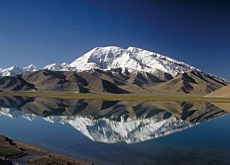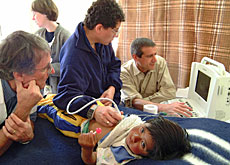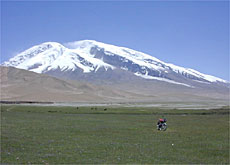Expedition seeks answers on Chinese mountain

Swiss researchers and climbers have set off for the Himalayas in search of some of the causes of altitude sickness.
The team of scientists and climbers will spend nearly three weeks perched on a Chinese peak to improve understanding of how the body and brain fight against the lack of oxygen at higher altitude.
The first group of volunteers, which left on Sunday, should take seven days to reach Muztagh Ata (“Father of Ice Mountains”) near China’s border with Tajikistan. Another group will head off on Wednesday.
After acclimatising at the base camp, the 38 “guinea pigs” will then spend time at three altitude camps at 5,500, 6,300 and 6,900 metres. The summit itself, which can be reached on skis, is over 7,500 metres high.
A team of scientists and physicians from Zurich University as well as Bern, Zurich and Aarau hospitals will carry out four different experiments.
The researchers will consider how extreme altitude impairs the brain’s functions, how breathing and performance are affected by the lack of oxygen, and how damage occurs to the human eye when climbing.
They will also look into how rapid ascents contribute to conditions such as high altitude pulmonary edema, acute mountain sickness and high altitude cerebral edema.
“This is the first time so many people have gone so high for research purposes,” said expedition leader Urs Hefti.
Limited risk
Despite the altitude, the risks involved are limited for the participants. “It is a very high mountain, but technically it’s not more difficult than your average backcountry ski tour,” explained the expedition’s head guide, Kari Kobler.
Should somebody suffer from an altitude-related ailment, they can reach base camp simply by skiing down the mountain.
The biggest challenge could in fact be the extreme temperatures that will be experienced during the expedition. Its members might find themselves baking at 45 degrees Celsius in Islamabad before freezing at –30°C up on the mountain.
The volunteers were chosen from among 100 people who were interested in taking part in the expedition. “We were looking first of all for adults no older than 55 with some climbing experience,” added expedition co-leader Tobias Merz.
Fifty candidates put their names forward, before the climbers were chosen based on their physical and technical aptitudes.
The final hurdle for the participants was the cost of the trip – nearly SFr8,000 ($6,323) per person. “With the logistics, research costs and the scientific equipment needed, the final bill could reach SFr1 million,” Merz told swissinfo.
Sponsors have helped soften the financial impact, either by providing financial aid or equipment. A major United States pharmaceutical firm is also sponsoring the research programme, while a series of scientific grants are paying for the scientists’ work.
The team is accompanied by Swiss mountain guides, but will also rely on Pakistani, Nepalese and Chinese climbing specialists and cooks.
swissinfo, Scott Capper
Peak: Muztagh Ata
Altitude: 7,546 metres
Location: Kunlun Shan range, Xinjiang, China
The peak is only 24 kilometres from the China-Tajikistan border.
The Karakoram Highway, the main road leading to Pakistan, runs nearby.
High Altitude Pulmonary Edema is a life threatening form of pulmonary edema that occurs in otherwise healthy climbers at altitudes above 2,500 metres.
High Altitude Cerebral Edema is a severe (usually fatal) form of altitude sickness. It is the result of swelling of brain tissue from fluid leakage.
Acute mountain sickness is a condition that is caused by lack of adaptation to high altitudes, whose symptoms include headaches, fatigue, shortness of breath, nausea, and sometimes even seizures and coma.

In compliance with the JTI standards
More: SWI swissinfo.ch certified by the Journalism Trust Initiative


You can find an overview of ongoing debates with our journalists here . Please join us!
If you want to start a conversation about a topic raised in this article or want to report factual errors, email us at english@swissinfo.ch.